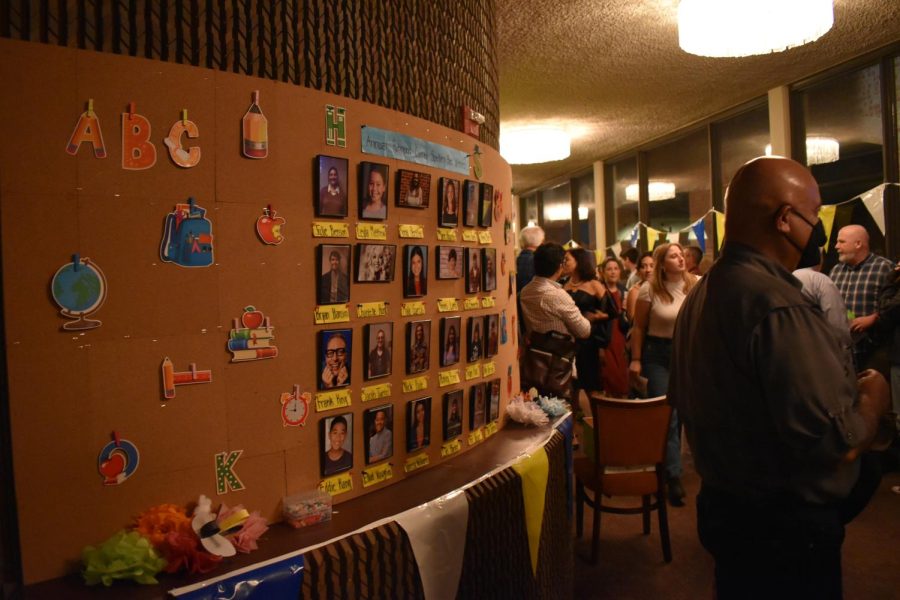“The 25th Annual Putnam County Spelling Bee”
What’s all the buzz about? Trinity Theater’s latest musical-comedy performance
Reception after “The 25th Annual Putnam County Spelling Bee” performance.
“The 25th Annual Putnam County Spelling Bee,” follows six characters competing in a spelling bee where everyone wants to be champion, but only one can win. These six are the spelling participants who bring their distinct personalities and quirks. Within the numerous musical numbers, they reveal the many perils and growing pains associated with adolescence. The show also recruits audience members to take part in the “Bee.” The interplay between the actors and audience members creates a fun and innovative performance that keeps the audience laughing with and at them.
The six spellers are: Leaf Coneybear, Olive Ostrovsky, Charlito “Chip” Tolentino, Marcy Park, William Barfée and Logainne “Schwartzy” SchwartzandGrubenierre. They all take turns trying to spell words such as “capybara” and “acouchy,” which sets up some crude humor in a show about children. The other characters are “comfort counselor” Mitch Mahoney, Vice Principal Douglas Panch and moderator Rona Lisa Peretti.
The show starts with Ms. Peretti reminiscing about the spelling bee she won 23 years ago, explaining her affinity for her winning word “syzygy.” The dimming lights during the opening number, “The 25th Annual Putnam County Spelling Bee,” are mirrored in subsequent musical numbers. Nathan Stith, associate professor and director of the theater department, unveils the particular significance of lighting in this piece. He says in this particular show, the lighting effects serve to distinguish the action from taking place at the spelling bee to taking place somewhere else.
Similar to Ms. Peretti, each character’s musical number also reveals something personal about them. For example, numbers like Olive’s “The I Love You Song” and Leaf’s “I’m Not That Smart” reveal Olive’s loneliness and Leaf’s fear of inadequacy, both touching on the struggles of adolescence. These deeper songs contrast light-hearted numbers, though, such as Chip’s “My Unfortunate Erection (Chip’s Lament)” and William’s “Magic Foot.”
Playing on the theme of the perils of growing up, Chip’s unexpectedly crude number about his member took place after he misspelled the unfortunate word “titup.” He misspells this word due to his body’s sudden excitement at seeing Marigold (Leaf’s sister) in the audience, who is played by a randomly selected audience member. He tries to cover himself with his “Spelling Bee Finalist” badge, but when Mr. Panch tells him his word he loses all concentration.
The relatability of Chip’s amusing experience mirrors the musical performance of Marcy Park. Marcy Park responds to Ms. Peretti’s introduction of her as being able to speak five languages with the musical number “I Speak Six Languages.” This song reveals her stress about constantly needing to achieve — whether it be in school, piano or athletics. Later in the show, though, her character’s struggle comes to a hilarious end when she asks Jesus if he can give her a harder word than “camouflage.” Then, Jesus dramatically comes in on a hoverboard with fog surrounding him and tells her he does not care if she wins the spelling bee or not. After this intervention, she purposely misspells her next word, showing her growth by not caring about winning and overcoming the need to achieve, all thanks to hoverboard Jesus.
Audience participation is one of the main parts of the show. During the show, the cast calls four audience members onstage to participate in the “Bee.” In a Broadway production, there would be four participants whom the cast asks to come on thirty minutes before the show. In Trinity’s production, members of the theater’s crew go into the lobby before the show and recruit volunteers.
Particular cast members, like Ms. Peretti and Mr. Panch, get to improvise each night when they call audience participants up to spell. Some of the things they do with the audience members include making up funny things to say, things like “she was a former Gerber Baby,” or “she is a member of the flat earth society.”
The show writers purposely give audience members easy words, such as “cow” and “optometrist,” in order to outrage the spellers. Though “optometrist,” is not an easy word, it was spelled out on a banner on stage. Although, one audience participant’s obliviousness to this fact caused her to struggle to spell optometrist, much to the unplanned amusement of the director and audience.
The spontaneity of the audience participation paired with the relatability of the awkwardness of growing up makes for a show which did not fail to deliver.
“‘The 25th Annual Putnam County Spelling Bee’ is total escapism,” Stith said. “It is hilarious and heartwarming and allows our audiences to escape from the troubles of the day and just have a good time.”

Hi! I am a freshman and my major and minor are undeclared as of now. As an Arts and
Entertainment Reporter, I am passionate about exploring restaurants...

My name is Claire Sammons and I am an Anthropology and Communications double major. I have worked for the Trinitonian since fall of 2020. I became a photographer...






